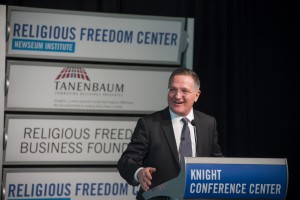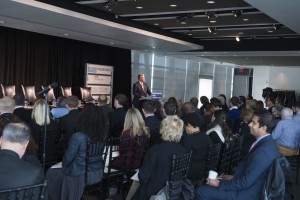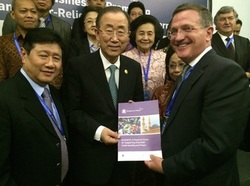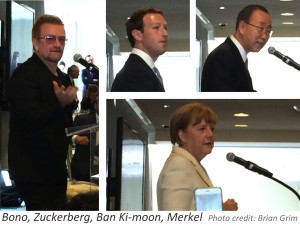 January 12, 2016: Washington, DC
January 12, 2016: Washington, DC
Brian Grim’s comments at the public launch of the Corporate Pledge on Religious Freedom (event photos by Maria Byrk/Newseum Institute).*
I’d like to give you the history of the corporate pledge that you have in front of you in support of Freedom of Religion or Belief (FoRB), the international formulation of what we here in the U.S. that we generally just refer to as religious freedom, based on Article 18 of the United Nations Universal Declaration of Human Rights. Article 18, in short, guarantees everyone’s right to have and practice a religion, change their religion, or have no religion at all.**
The history of the corporate pledge – like the history of a company or business – is really the history of the people who made it and continue to make it day after day.
The idea for the corporate pledge began in the Middle East in the 1990s, when the vice president of the Religious Freedom & Business Foundation, Greg Clark, then Managing Legal Counsel for Occidental Petroleum in the region, saw how local governments responded when they met with State Department officials on human rights and religious freedom issues – polite but not a high priority. By contrast, when Occidental representatives raised a concern that affected its employees or interests, it was treated as a priority.
 At the same time, and quite independently, I was heading up the first faith-based development organization in what was then the Kazakh Soviet Socialist Republic. As the Soviet Union was dissolved, the new (and current) president of Kazakhstan immediately announced support for religious freedom, and one his first actions was to turn over the Communist Party Training School to be turned into the country’s first business school. At that point Pres. Nazarbaev perceived a direct connection between religious and economic freedom. As a result, and certainly not perfectly, Nazarbaev envisioned a future where Muslims, Christians and people of various faiths could work together to build a new country.
At the same time, and quite independently, I was heading up the first faith-based development organization in what was then the Kazakh Soviet Socialist Republic. As the Soviet Union was dissolved, the new (and current) president of Kazakhstan immediately announced support for religious freedom, and one his first actions was to turn over the Communist Party Training School to be turned into the country’s first business school. At that point Pres. Nazarbaev perceived a direct connection between religious and economic freedom. As a result, and certainly not perfectly, Nazarbaev envisioned a future where Muslims, Christians and people of various faiths could work together to build a new country.
That’s a bit of ancient history.
Since then, and after many years in corporate law, my colleague Greg Clark left the Middle East volunteered for his church as its legal and religious freedom representative for Brazil. From there, he got me interested in looking at the global research on I’d been coordinating for the better part of a decade at the Pew Research Center from a different perspective – from the self interests of businesses and governments. Indeed, research I’ve published with Greg as well as a string of articles at the World Economic Forum, where I serve as chair of the global agenda council on the role of faith, show just that. Where religious freedom and the diversity that arises with it are protected and respected, sustainable, long term economic development is more likely. One of the main causal links is that where religious freedom is present, peace and the stability it provides for businesses to grow is much more likely. For more on that argument you can see my Cambridge University Press book with Roger Finke, The Price of Freedom Denied.
And, it was in Brazil, that the idea came about for this corporate pledge that is accompanied by a packet of supporting corporate documents you can find on our website. The first step was for me to leave Pew and set up the Religious Freedom & Business Foundation as a platform to study and make known the connections between religious freedom and better socio-economic outcomes. The launch of the foundation took place in 2014 in Brazil, that included not only the Brazilian vice president Michel Temer, but also leading business people, one of whom simply observed that if we could provide him some basic language in support of freedom of religion and belief and religious nondiscrimination – things that he already wholeheartedly supported – that he’d be glad to get it inserted into the corporate documents of the companies he controlled.
That’s when two corporate lawyers here with us today – Gavin Parker and Rob Ellis – volunteered to turn the idea into a series of corporate documents that you can find on the Religious Freedom & Business Foundation website under “initiatives”, including the corporate pledge you have today. Rob and Gavin transformed some rough concepts into drafts that were then circulated to a number of religious freedom experts, including the religious freedom round table that Charles Haynes helps coordinate; the folks at Tanenbaum, including Mark Fowler, Elizabeth Joslin and Eliza Blanchard; and several of the panel members who will speak later, including Dan Mach from ACLU, Richard Foltin from AJC.
 This corporate pledge has also been developed in the context of a partnership that the Religious Freedom and Business Foundation has with the United Nations. Around the same time that I was setting up the Foundation, Secretary General Ban Ki-Moon set up the Business for Peace Platform within the United Nations Global Compact. Together, we plan to hold an awards event during the upcoming Olympics in Brazil recognizing business leaders who are advancing interfaith understanding, religious freedom, and peace through their company’s work, their own advocacy, or through public-private partnerships.
This corporate pledge has also been developed in the context of a partnership that the Religious Freedom and Business Foundation has with the United Nations. Around the same time that I was setting up the Foundation, Secretary General Ban Ki-Moon set up the Business for Peace Platform within the United Nations Global Compact. Together, we plan to hold an awards event during the upcoming Olympics in Brazil recognizing business leaders who are advancing interfaith understanding, religious freedom, and peace through their company’s work, their own advocacy, or through public-private partnerships.
We are honored today to have a board member of the UN Global Compact with us, Y.W. Junardy, Chief Corporate Officer of the Rajawali Corp., a business group involved in multiple industries across Indonesia. Junardy is a true global leader in putting to practice the potential of business as a force for good. Just two examples among many. First, Junardy enlisted Sec. Gen Ban Ki-Moon to help launch a new resource on how business is a powerful force to support interfaith understanding, practical religious freedom, and peace. The joint publication with my Foundation and the UN Global Compact Network in Indonesia gives case studies of four different ways businesses do this, including: 1) using marketing expertise to bridge borders; 2) incentivizing innovation; 3) incubating and catalyzing social entrepreneurship; and 4) supporting workplace diversity. Since launching this in Indonesia in 2014, we’ve since translated it into Portuguese and featured the publication at a major religious freedom and business event in Brazil. The event was attended by some 700 business and community leaders and was hosted in Brazil’s first mosque. Second, Junardy has used his business to help alleviate poverty among multiple faith groups in Indonesia by overcoming a severe social problem, that is many people in Indonesia found themselves in the situation that they are living as families out of wedlock, preventing their children from being registered and essentially living as stateless persons. He’s helped thousands of couples marry by hosting mass interfaith wedding events, one of which he has just come back from Timor-Leste.
 These connections through the UN Global Compact have allowed the role of religious freedom to be highlighted among top business leaders, including at a recent event with Facebook’s Mark Zuckerberg and some 300 other corporate leaders at the UN. Just as an example of one result from that, Aviva, one of the UK’s largest and oldest insurance companies, has taken an interest in the corporate pledge that you have before you.
These connections through the UN Global Compact have allowed the role of religious freedom to be highlighted among top business leaders, including at a recent event with Facebook’s Mark Zuckerberg and some 300 other corporate leaders at the UN. Just as an example of one result from that, Aviva, one of the UK’s largest and oldest insurance companies, has taken an interest in the corporate pledge that you have before you.
I’d like to recognize another special guest, Arnie Podgorsky, a corporate lawyer here in DC, working with Fouad Makhzoumi, a Lebanese billionaire working in the gas and pipe business. Unfortunately Fouad can’t be with us today, but his work is an example of how a businessman in a difficult part of the world sees religious freedom as critical for socio-economic success. In addition to being an outspoken advocate for religious freedom, The Makhzoumi Foundation has provided job training for over 400,000 people in Lebanon – that’s one in ten people in the country. But the unique nature of the program is that Makhzoumi, a Sunni Muslim, insists that the job training benefit all in Lebanese society, not just members of his faith. As he says, only when people of all faiths have the opportunity to rise together can the economy of a country be successful.
Finally, and now going back to really ancient history, I grew up in a house where business and faith interacted quite naturally. My parents are here today. And it was my father who while working as a chief engineer for a major international corporation also was head of our church’s building committee, led a boy scout troop, taught Sunday school, and participated in a stock club. All those activities fit naturally together, with his faith and work providing an example to me of how the freedom to be who you are wherever you are is one of the great sources of innovation and human development.
Panel Discussion
- – Senator Gordon H. Smith, President & CEO, National Assoc. of Broadcasters
- – Joyce S. Dubensky, Esq., CEO, Tanenbaum
- – Richard T. Foltin, Director, National and Legislative Affairs in American Jewish Committee’s Office of Government and International Affairs
- – Brian Grim, President, Religious Freedom & Business Foundation
- – Charles C. Haynes, Vice President Newseum Institute / Religious Freedom Center and a senior scholar at the First Amendment Center
- – Dwayne Leslie, Associate Director in the Department of Public Affairs and Religious Liberty and Director of Legislative Affairs for the General Conference of Seventh-day Adventists
- – Daniel Mach, Director, ACLU Program on Freedom of Religion and Belief
- – Zainab Al-Suwaij,Executive Director and a co-founder of the American Islamic Congress (AIC)
Questions to the Panel:
(1) Let’s begin with the U.S. Supreme Court ruling of last June 1st in favor of Samantha Elauf, an American Muslim woman who wears a hijab and was denied a job at Abercrombie & Fitch when she was 17. Elauf claimed the company did not offer her a job because her religious identity, and specifically because her hijab, violates Abercrombie’s “look policy.” The court ruled 8-to-1 in favor of Elauf. What are some of the various ways that U.S. law protects employees from religious discrimination in hiring, firing and advancement?
(2) Turning now to a more recent event hitting the news is a workplace prayer dispute with Somali workers at Cargill Meat Solutions Fort Morgan, Colorado, meatpacking plant that led to the firing of about 190 employees. The workers who lost their jobs were mostly immigrants from Somalia, and their termination came after they failed to report to work for three consecutive days in December to protest what they say were changes in times allowed for Muslim prayer. Cargill says, however, it makes every “reasonable attempt” to provide religious accommodation for all of its employees at the Fort Morgan plant without interrupting operations. This raises the question of how far employers should be expected to accommodate religious practices in the workplace. Are companies doing enough?
(3) Last week it was reported that more than 100 Georgia-based businesses have formed a partnership to oppose religious freedom legislation that has sparked convention and tourism boycotts in states where it has been passed into law, most notably in Indiana last fall, with Apple CEO Tim Cook as a leading critic. These businesses argue that religious freedom legislation will be used to discriminate against LGBT people in employment and public accommodations. Certainly, the question of “if and how to accommodate employees with a religious objection to same-sex marriage” is a live issue. How should companies balance ostensibly conflicting claims for rights from LGBT and religious employees? What role should companies play in publicly supporting or denouncing religious freedom legislation?
(4) And now to wrap up, I’d like to return to the corporate pledge. What possibilities do you see for advancing the four points*** of the pledge within the business community?
* The event was co-hosted by the Newseum Institute’s Religious Freedom Center, the Religious Freedom & Business Foundation, and Tanenbaum Center for Interreligious Understanding.
** Article 18: “Everyone has the right to freedom of thought, conscience and religion; this right includes freedom to change his religion or belief, and freedom, either alone or in community with others and in public or private, to manifest his religion or belief in teaching, practice, worship and observance.”
*** (a) Promoting Sustainable and Innovative Business Through Protecting Freedom of Religion or Belief; (b) Non-Discrimination and Non-Harassment on the Basis of Religion or Belief; (c) Religious Accommodation and Inclusion; and (d) Protecting and Promoting Freedom of Religion or Belief (FoRB) in Our Communities
